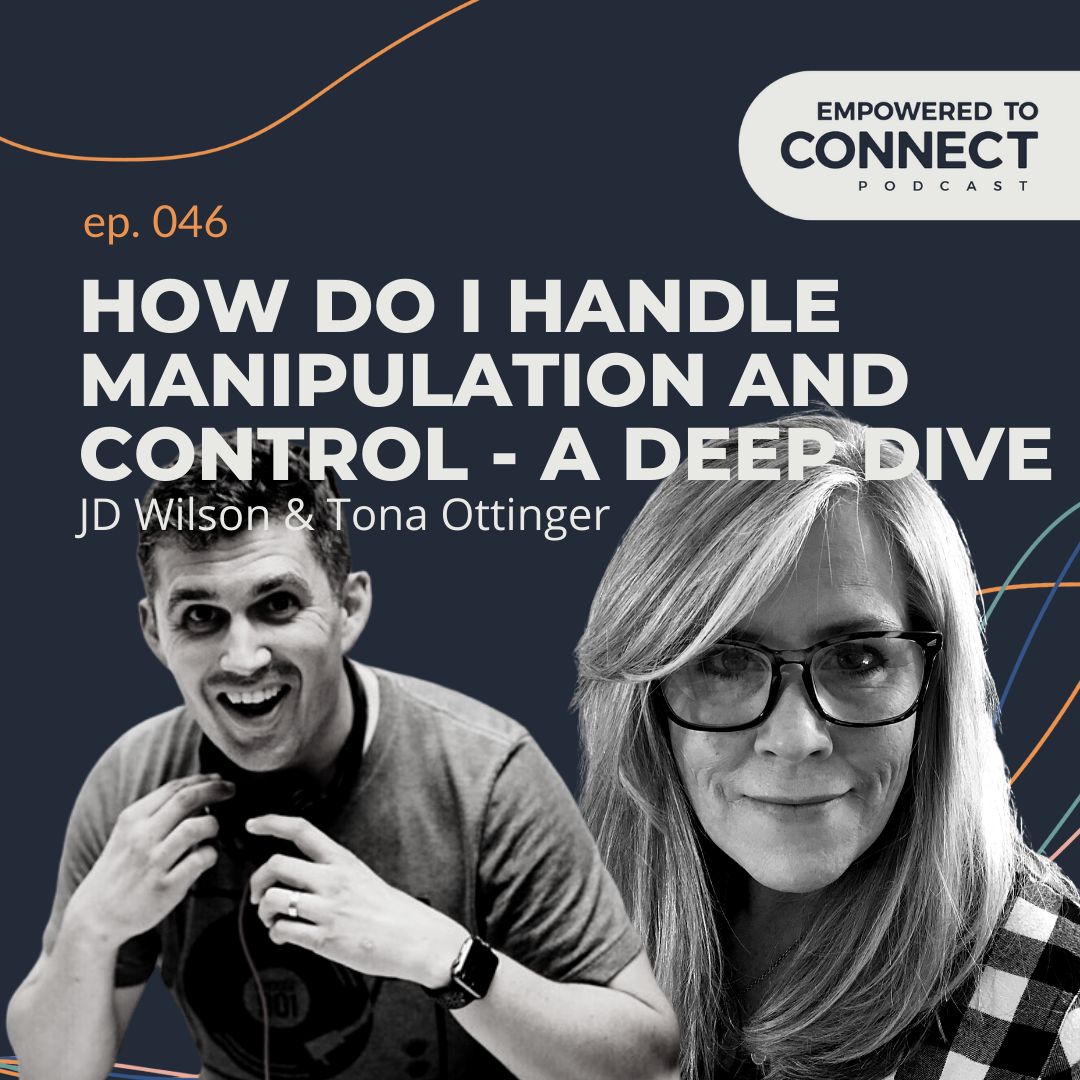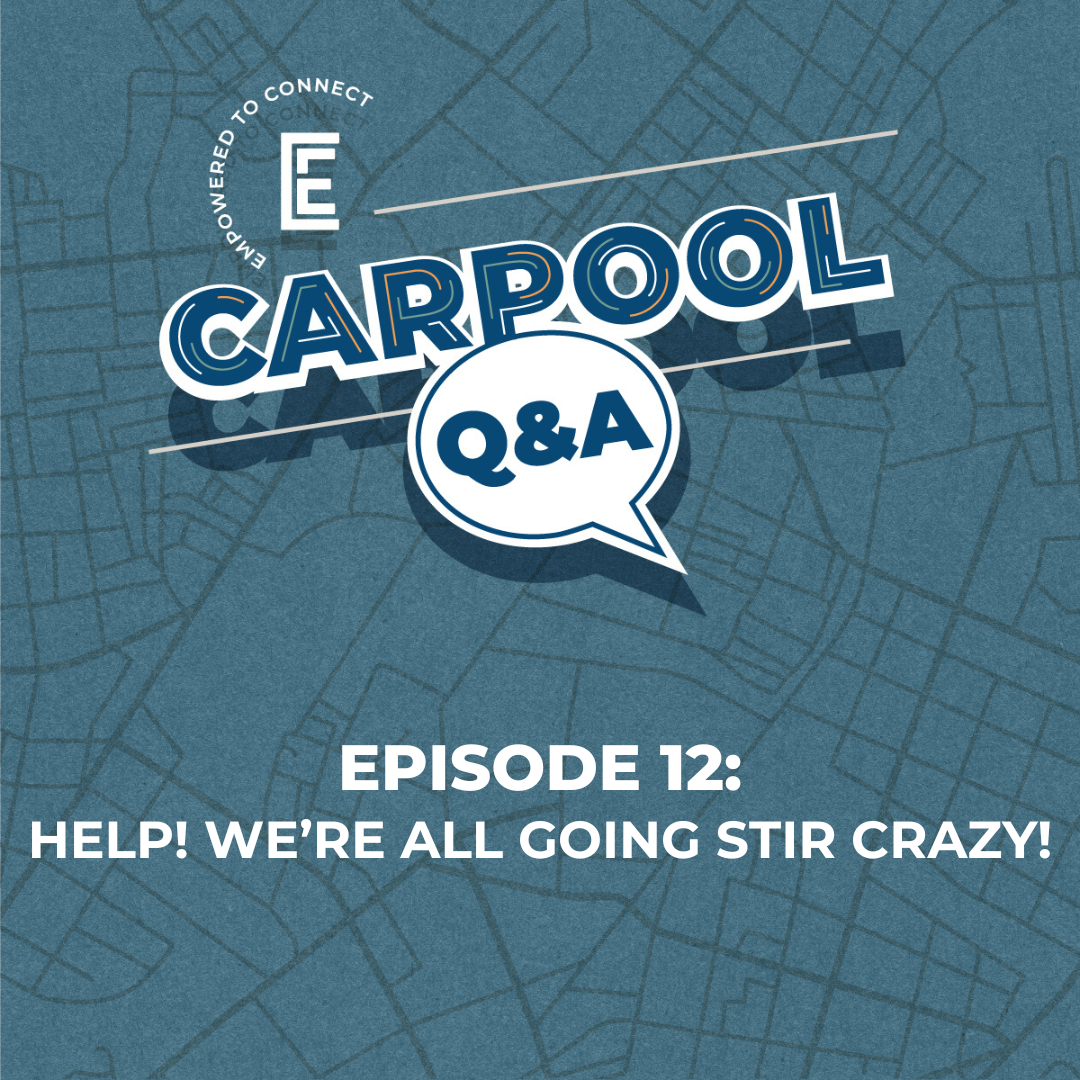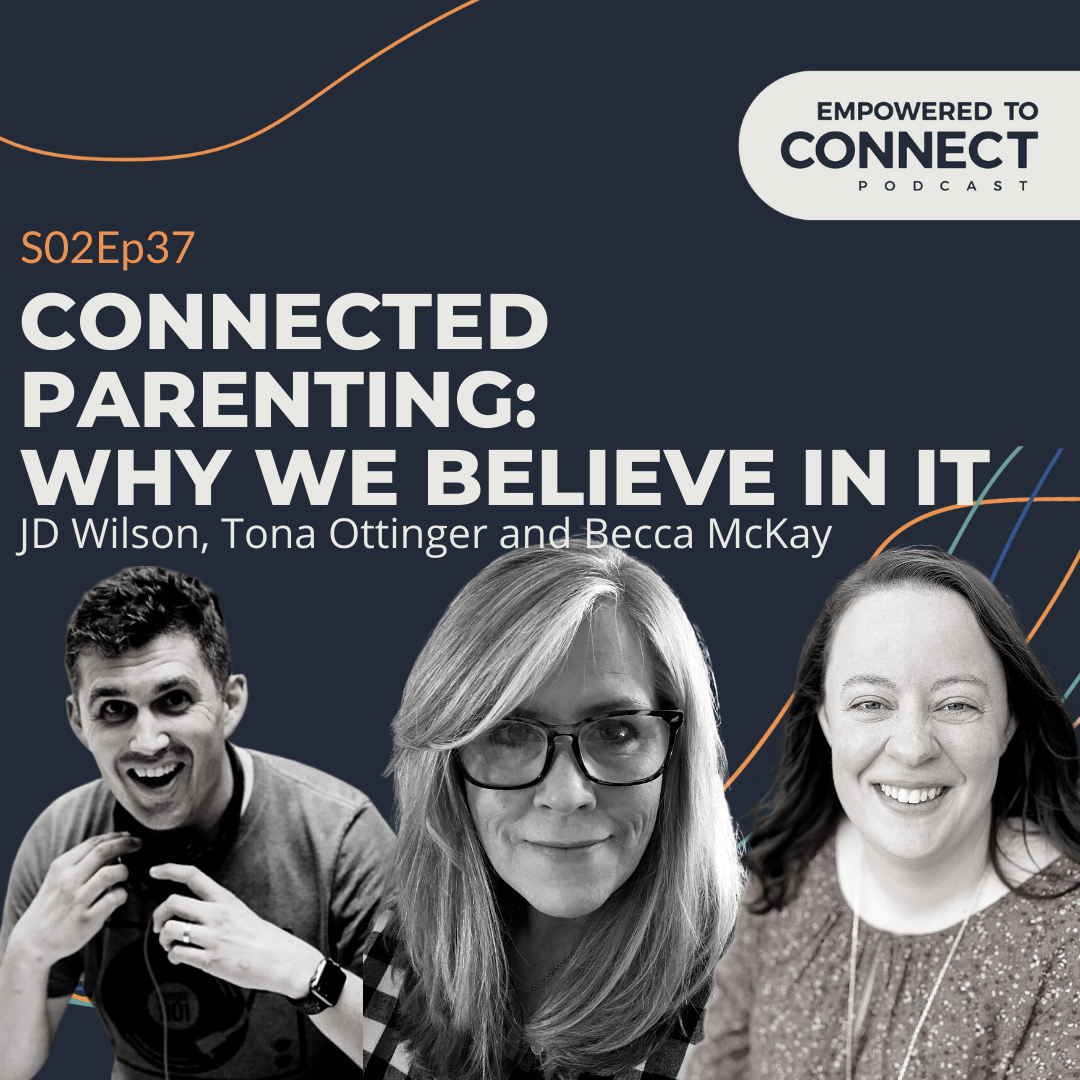Episode Transcript
[00:00:12] Speaker A: Welcome to Carpool. Q A with Empower to connect these are our shorter episodes to help get you from point A to point B. Our deep dive. Long discussion conversations, long form conversations. Our post posted to our feet on Tuesdays. This is just a conversation to help you while you might be in the car Ubering kids from point to point. Or maybe you just drop them off and you've got a few minutes, whatever it might be. This is just a short conversation about one specific topic. And it is Becca McKay, Tana Odinger, and myself. And we are going to each week one of us brings a topic without the other two knowing what it is, and then we jump into that discussion. And today it is my turn. And so know we have actually had some longer form conversations about this. But I wonder if there's a quick, direct conversation in this specific topic is how do you handle perpetual lying?
[00:01:10] Speaker B: Short conversation bringing in here light on us here on this Friday.
[00:01:14] Speaker A: JD, share the cure.
[00:01:16] Speaker B: Are you talking about the parents lying or the children?
[00:01:20] Speaker A: JD, I'm just teasing all of the above.
It's funny because we've heard from multiple friends, even just this week, just with questions about this. Like, hey, what do you do about this? And this is something that we faced before and something, I mean, I think I have shared this on other podcasts before that I struggle with growing up as a kid. So I feel like I have some unique perspective to this a little bit. But when we start off thinking about this, we have typically at etc. Had what would be probably a non traditional view on how we approach lying or handle lying. And why don't we get into that?
[00:02:06] Speaker B: Why don't we get into that? Becca, Becca. He says, all right, come on, Becca.
[00:02:11] Speaker C: Oh, man, listen to the two longer episodes. If this one sparks, think one.
I think Robin Gobble said it on a podcast that we did with her was just like, we all lie. So she was like, take a hard look. Think about the last time a friend said, can you do XYZ? And you said, oh, I'm so sorry, I can't because of Y. And that was not true. So first of all, just take lying. Maybe a little bit off of a pedestal. Lying is a human behavior that makes sense if the goal is to not make waves.
So if you think about, like, we're trying not to make waves. So as a kid, we're lying for who knows what the reason is. Maybe scared of getting in trouble, maybe embarrassed, maybe sometimes, maybe fun. Like, I'm telling a fun story because I think it would be cool and I want you to think that this is cool, too, maybe to look a little better than we are. Think about, too. As you're a kid and into your young adulthood, you're really forming your identity. You're trying on different things to see what fits you. And so lying is part of that. Of trying on different things.
Yeah, you put us on the spot with a big one. JD.
My top of the head is consider, are you driving lying by creating a ton of fear around it and, like, big heavy hammer responses and consider.
Yeah, just consider, okay, if this is a human behavior that happens and we want to correct it over time, how can we do that with connection.
[00:03:54] Speaker B: To sort of piggyback on what Becca said a little bit, I also think about, I mean, there are just some neurodiversity that needs to be taken into account here as well. And maybe, like, the speed of the brain and how it's wiring and working as it's processing information.
And so sometimes just giving a little bit of room and understanding for that. Like, the brain works a certain way, and lying is part of how the brain is working, and our stress system is activated in certain situations. And so what would it look like? And this is a big one. So I'm proposing a big idea here, and I'm proposing it to Tana Odinger. This is a proposal to myself. What if we just looked at it as a whole different kind of thing? What if we just looked at lying with a totally different framework of understanding and a totally different set of lenses than maybe the traditional perspective of lying? Or how we may have grown up thinking about lying, or how we may have started our parenting journey thinking about, you know, I think we assign big intent, and I say we. I'm going to stop saying that. I think I sign big intent and big motivation to lies when that's probably, as Becca said, not really what's going on. And it's not this know, I'm going to get something over on my mom, which is sometimes how it feels inside of my body when it's happening.
So understanding what's happening in us when it's going on is probably maybe, like, the biggest part of it all, actually.
[00:05:44] Speaker A: Yeah, I can say yes to lots of things. I mean, for myself, growing up, it was sometimes fun to tell exaggerated stories, didn't happen just to get the reactions of the crowd. It was sometimes trying to avoid trouble, trying to avoid consequences, or trying to avoid getting in trouble for something. Sometimes there was just a shame that was too deep to tell the whole truth of a situation, of how I had made a mistake or had a failure or whatever. And so I was going to share a corner of it and try to then do the technicality of like, well, I told you about this. I mean, maybe just like the whole mean from my own personal experience, there's, I think, yeah. Tana thinking about same. And let me just say, for those of you out here who are hearing this and struggling with this conversation, it is so much easier to talk about this in microphones in a moment and kind of posit or give our views on this in a sober minded, clear minded, like, not in the middle of a battle with a kid moment than.
[00:06:54] Speaker B: It is like I'm sitting at my desk with my coffee in hand, there are no children around, and I can have this regulated reflection moment on how I feel when somebody might lie to me. But I'm sure if you handed the microphone to one of my children, they'd be like, that is not the mom we know when we've actually done that. So thank you for that, JD.
[00:07:15] Speaker A: Yeah. And then how we handle that. I sometimes react with great compassion because of my own personal experience to lying. I sometimes react with the fury of 1000 sons or whatever out of fear that this kid is going to struggle the way that I did with learning to tell the truth and to be forthright. Right. So we're all going to have different reactions and reasons behind those reactions. I think, again, my clear minded up here, and we're listening to a podcast, so I'm emotioning above my head. This clearer minded thought would be that just like we say with other behaviors, there are needs being expressed behind a.
And I think it was Robin that talked about that need to create felt safety. As we go back to kind of the core principles, all these conversations end up kind of going back to one road, right, which is like, got to create safety if there's safety to be fully known and fully loved. Like as a child, it takes a lot of the pressure off to lie. So if you have a safe place and you know that no matter what I share, I'm good, I've still got the relationship here. And then we're going to be able to tackle this together without some big reaction. It's easier to tell the truth. That's something that I would say.
That sentence in and of itself is a hard dynamic to create. That would be like a goal, like a utopian kind of parenting paradise would be. Everybody in the family feels uniquely safe to bring their whole failures and successes self to the picture without fear of whatever you might be fearful of. Right, but that is the goal. That would be. The goal would be to create that safety. And so if there's lying and you're addressing the lying, how can we figure out the actual route? Why is the lying happening? And then how can we create a felt safety or address the needs that are being expressed in that area if we're lying about grades? Like, yes, I did. And again, I was a frequent flyer in this department. Yeah, I did that homework. Reason I don't want to do homework right now. I've got insatiably football to play on the Xbox downstairs or like, oh, crap, I already told you I was going to do that homework. And yes, I did get turned in and I really will. As soon as you're not looking like, get it done real fast and get it submitted so that I didn't lie to you earlier. Air quotes.
But both those things might be like, hey, no drama, that's fine. Just get it done.
[00:10:01] Speaker B: Yeah.
[00:10:02] Speaker A: You didn't get done earlier. Well, I tell you what, just to help you, I'm going to sit with you. We're going to get in now instead of like, how dare you lie to me and tell me that it was done. It wasn't done. You're going to do this and you're all going to have a massive consequence. You think about that. You just either created the best liar in the world or ten years, right?
Again, that's said as a repeat offender. Right. So I think the best thing in the situations, if you do have a kid that is showing a propensity to lie a lot, may be to really double down on felt safety, really double down on connection, to say, hey, what I really want to know is just, I'm not worried about the lying and that's you lying as a parent because you're super worried about the lying. What you're trying to communicate is, I'm not worried about the lying, but that you would feel like you had to lie to me. You couldn't bring the truth.
That's what makes me more concerned. I want to make sure that, you know, you can always bring whatever to me and you're not going to have this big reaction or blow up from me. We're going to tackle stuff together.
That might be the best approach if you're dealing with it systemically with one particular kid. I don't know.
[00:11:16] Speaker C: It's messy, too, because you add in siblings and then it's, well, sister said you did this to brother and brother is saying, no, I didn't. And there's a lot of kids, whenever they're young, aren't very able to see someone else's perspective that's still growing and developing. And so we're asking them to do, like, an adult level thing. We're asking them to stop and think about how sister felt and think about her perception and how did you react and why. So I think, too, one thing that I've encouraged parents is, like, if you already know the truth, you don't need to force them to say it, because that can increase shame. So if your kid is hiding candy and you walk in the room and you see the candy wrappers on the floor, they don't need to say, mom, I stole the candy. You know what happened? So sometimes we create these environments for them to lie. Like we're setting them up to fail, instead of just addressing why are they needing and seeking to hide candy in their room? What's the lack of felt safety? What's the need behind that behavior? What's the family structure that we need to implement? What do we need to do when it's, like, sibling conflict? Something that I did a lot with kids at school was thinking about, like, if they said, I didn't hit him, I just knew that what they meant was, I didn't mean to hit them. I know I shouldn't have hit them. They didn't mean I didn't hit them. They meant, I know I shouldn't have done that. And so when their knee jerk is, I didn't hit him, I could have gone, well, you're lying. Because I saw you hit them, and I watched it with my own two eyes. What I can pause and do again, like Tana said, when I'm calm enough, when I'm regulated, when, like, using all of my logical thinking, I can be like, okay, what happened before? Oh, well, she was making fun of my mom, or she was making fun of this or that, and you felt really mad. And what did you do when you felt really mad? There's a little bit of, like, we kind of set kids up to lie to us sometimes. I'm not saying that it's always the adult's quote unquote fault, but I'm just saying sometimes we know the truth. We don't need to belabor them saying it. We just need to deal with, what did they do? Did they hit? Did they hide? Did they steal? Like, what were they doing that we're now setting them up to lie about? Does that make sense?
[00:13:40] Speaker B: It totally does.
So, because I'm doing my best to be vulnerable, here's my little thing I'm feeling inside. We can do it all right.
And we can create all the felt safety in the world.
And they're still going to lie.
[00:13:58] Speaker C: Yeah.
[00:14:01] Speaker B: And that's just something I've had to work through for my own self. And what does it mean for me to show up in a scenario that highly impacts me as a person? Like, lying is one of my biggest, biggest buttons. So it's been a journey, and still is a journey of how do I show up for my kid in relationship knowing that I actually kind of have done everything I can do and we might not be moving towards truth telling at the rate at which I would like. And what does it mean to not give up on knowing that we have a lifetime of relationship God willing to continue to work on? What does it mean to feel safe enough together to be our full, vulnerable selves? Like, JD, I loved what you said. When you're like, maybe the shame core is just too big to show it all, to uncover it all.
That to me is the deep commitment is like, we can do our best and it's probably still not going to solve all fibs, exaggeration, exclusion of full truth, all of that kind of thing, because we're human. So we started this little moment on, hey, lying is a human behavior. And maybe I would want us to end with like, hey, mom, dad, caregiver, educator, person, caring for children. You can create all the felt safety in the world and they're still going to lie to you because lying is a human behavior, but our role is to try to build those relationships and places of felt safety. And you said something, JD, earlier, and I'm like, man, what if? What if? And gosh, this is just because I haven't always done this well, y'all, which is like, you can tell me anything and I'm totally going to help solve the problem with you. And then maybe they actually do. And then maybe my body and my neurobiology and my stress response still doesn't respond in a way that builds felt safety. So what does it look like to repair and be humble and be like. That really was hard for me to hear, and I'm still in it with you, so it's complex, especially as they get older. And maybe the lies or the exclusion of the full truth has more dire consequences.
So don't fall into a spiral shame. If your kid's lying to you, it doesn't mean you aren't a safe person. It doesn't mean you aren't a good parent. It means there's a lot of complexity there and just keep showing up and keep trying to create and cultivate an environment where you are regulating. While the truth is hard to hear, just try to stay regulated when the truth is really painful.
Because the truth might be something about you.
Hey, Mom.
I was scared to tell you that because you blow up or you're scary or if it's personal.
I don't know. I have a few things I'm pulling from here. You all little personal experience on this one. So thanks for teeing me up.
And so I'm still immeshing it all. It's a process maybe. Yeah, that's what I've got today.
[00:17:24] Speaker A: Well, great.
[00:17:28] Speaker B: Okay.
[00:17:32] Speaker A: Latest chapter in this saga, right? Like we're just going to keep on trudging forward. So you know what, if you got questions, you thoughts on this yourself, drop us a comment below. Let us know either in Instagram or Facebook or our podcast feedback form on the website. So thanks. We will see y'all soon.


